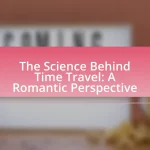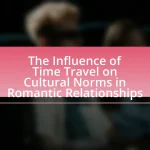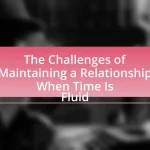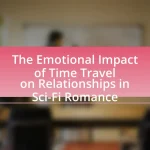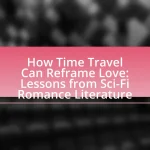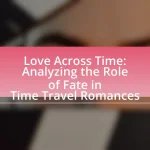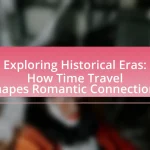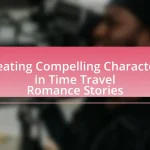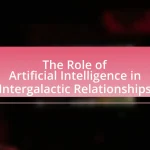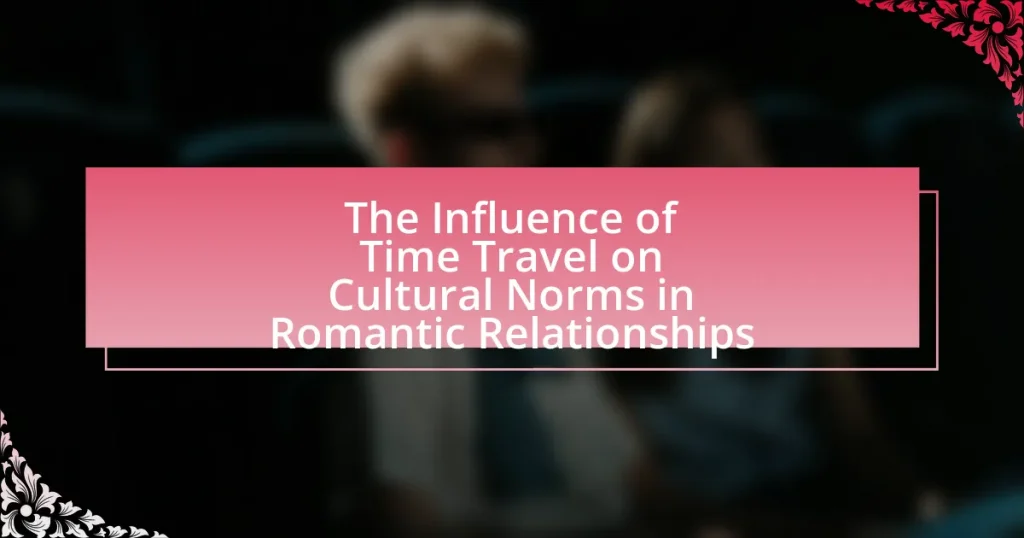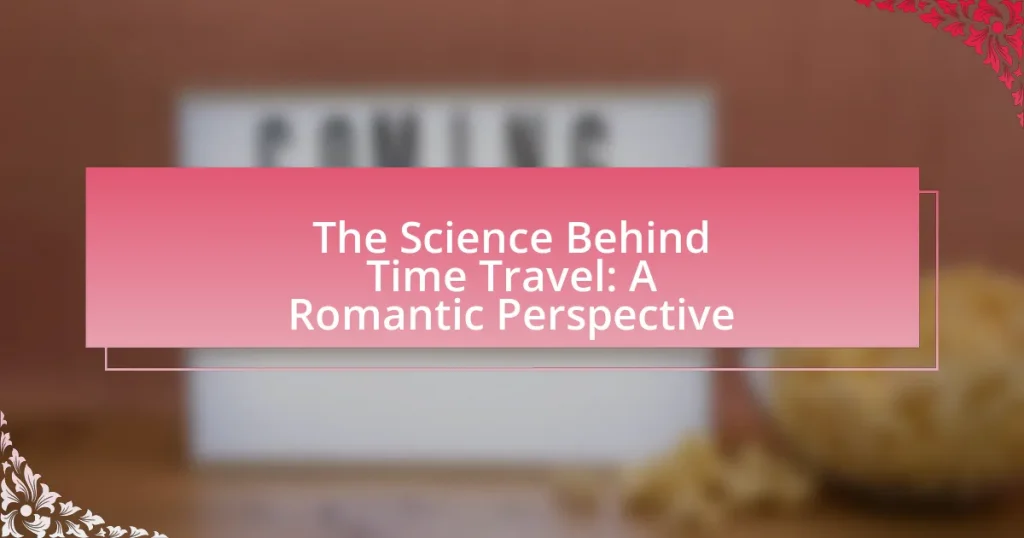The article examines the influence of time travel on cultural norms in romantic relationships, highlighting how narratives involving time travel challenge traditional perceptions of love, commitment, and fidelity. It discusses how characters in various stories navigate relationships across different eras, prompting a reevaluation of emotional attachments and societal expectations. Key themes include the impact of historical context on romantic ideals, the fluidity of commitment, and the complexities introduced by time travel in understanding fidelity and personal identity. Additionally, the article explores how different cultures interpret time travel in relation to relationships and the lessons that can be drawn from these narratives to inform contemporary relationship dynamics.
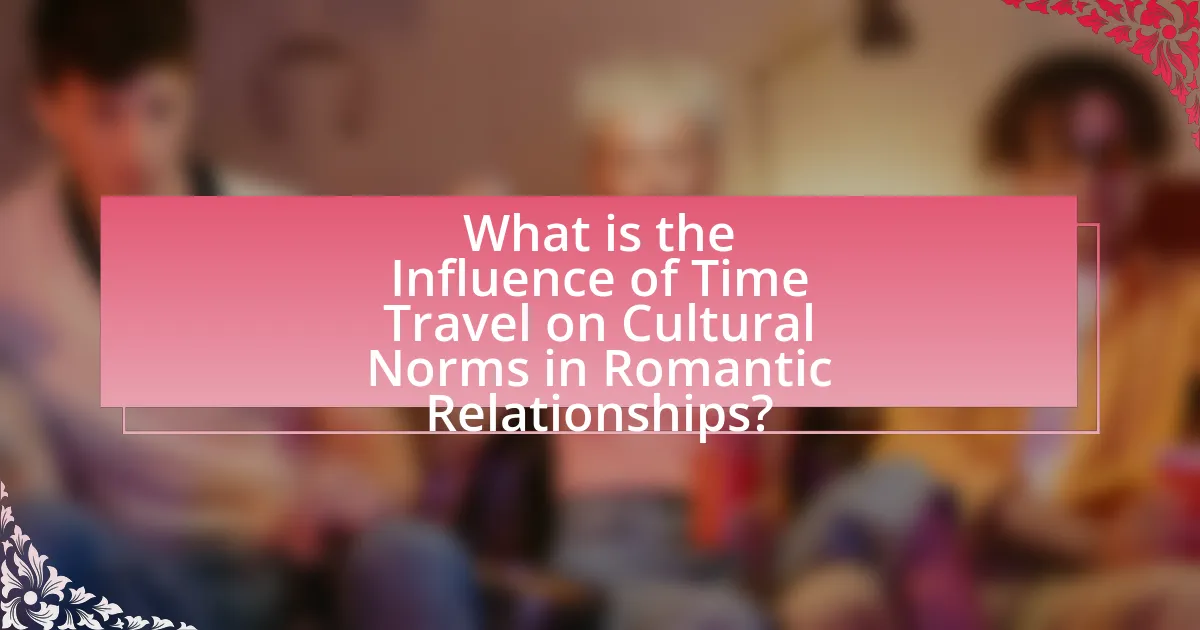
What is the Influence of Time Travel on Cultural Norms in Romantic Relationships?
Time travel significantly influences cultural norms in romantic relationships by altering perceptions of time, commitment, and fidelity. In narratives where time travel is a central theme, characters often experience relationships across different eras, leading to a reevaluation of traditional norms such as monogamy and the significance of temporal context in love. For example, in the film “About Time,” the protagonist uses time travel to navigate romantic challenges, illustrating how different cultural attitudes towards relationships can emerge based on historical context. This suggests that time travel can serve as a narrative device to explore and challenge existing cultural norms, prompting audiences to reconsider their own beliefs about love and relationships.
How does time travel conceptually alter perceptions of love and relationships?
Time travel conceptually alters perceptions of love and relationships by introducing the possibility of experiencing different timelines and outcomes, which can challenge traditional notions of commitment and fidelity. This alteration allows individuals to explore alternate realities where relationships may evolve differently, leading to a reevaluation of emotional attachments and the significance of choices made in the present. For instance, narratives in literature and film, such as “The Time Traveler’s Wife,” illustrate how time travel can create complex dynamics in love, emphasizing the impact of time on emotional connections and the potential for regret or longing for what could have been. These explorations highlight how the fluidity of time can reshape understanding of loyalty, desire, and the permanence of relationships.
What historical examples illustrate time travel’s impact on romantic norms?
Historical examples illustrating time travel’s impact on romantic norms include the narratives found in H.G. Wells’ “The Time Machine” and the film “Back to the Future.” In “The Time Machine,” the protagonist’s journey to the distant future reveals a society where romantic relationships have evolved into a more utilitarian form, reflecting societal changes over time. This shift challenges traditional notions of love and partnership, suggesting that time travel can alter the fundamental understanding of romance. Similarly, “Back to the Future” explores the consequences of altering past events on romantic relationships, particularly through the character of Marty McFly, whose actions in the past affect his parents’ relationship and, consequently, his own existence. These examples demonstrate that time travel narratives often serve as a lens to examine and critique evolving romantic norms, highlighting how temporal shifts can reshape societal expectations around love and partnership.
How do different cultures interpret time travel in the context of relationships?
Different cultures interpret time travel in the context of relationships through unique narratives and beliefs that reflect their values and social norms. For instance, in Western cultures, time travel often symbolizes the desire to correct past mistakes in romantic relationships, as seen in films like “Back to the Future,” where characters seek to alter their romantic outcomes. In contrast, many Eastern cultures, such as those influenced by Buddhist philosophy, view time as cyclical, emphasizing the importance of living in the present and accepting past relationships as part of one’s karmic journey. This perspective can lead to a more forgiving attitude towards past romantic failures, as they are seen as lessons rather than events to be changed. Additionally, Indigenous cultures may incorporate time travel into their storytelling, using it to connect with ancestors and understand familial relationships across generations, reinforcing the idea that relationships are influenced by historical context. These interpretations highlight how cultural backgrounds shape the understanding of time travel’s implications on love and relationships.
Why is understanding this influence important in contemporary society?
Understanding the influence of time travel on cultural norms in romantic relationships is important in contemporary society because it shapes perceptions of love, commitment, and societal expectations. This influence allows individuals to explore different historical contexts and their impact on modern relationship dynamics, fostering a deeper understanding of how cultural narratives evolve. For instance, literature and media often depict time travel as a means to challenge traditional norms, encouraging discussions about gender roles and emotional connections. By analyzing these narratives, society can better comprehend the fluidity of romantic ideals and the potential for redefining relationships in a rapidly changing world.
What lessons can be learned from fictional portrayals of time travel in romance?
Fictional portrayals of time travel in romance teach that love transcends time and societal norms, emphasizing the enduring nature of emotional connections. These narratives often illustrate how characters navigate complex relationships across different eras, revealing that love can adapt to varying cultural contexts and expectations. For instance, stories like “Outlander” showcase how characters confront historical gender roles and societal constraints, ultimately highlighting the importance of personal choice and agency in romantic relationships. Such portrayals encourage audiences to reflect on the fluidity of love and the impact of historical context on personal relationships, reinforcing the idea that love can challenge and reshape cultural norms.
How might time travel challenge traditional relationship dynamics?
Time travel could fundamentally challenge traditional relationship dynamics by allowing individuals to interact with past or future versions of themselves or their partners, thereby altering the context and expectations of relationships. For instance, if a person travels back in time to meet their partner at a different stage in life, it could create conflicts regarding identity, loyalty, and commitment, as both individuals may have evolved differently over time. Additionally, the ability to foresee future events could lead to decisions based on knowledge of outcomes, undermining the spontaneity and organic development of relationships. Historical examples in literature and media, such as “Back to the Future” and “The Time Traveler’s Wife,” illustrate how time travel can complicate emotional connections and create ethical dilemmas, thereby reinforcing the notion that time travel could disrupt established norms in romantic relationships.
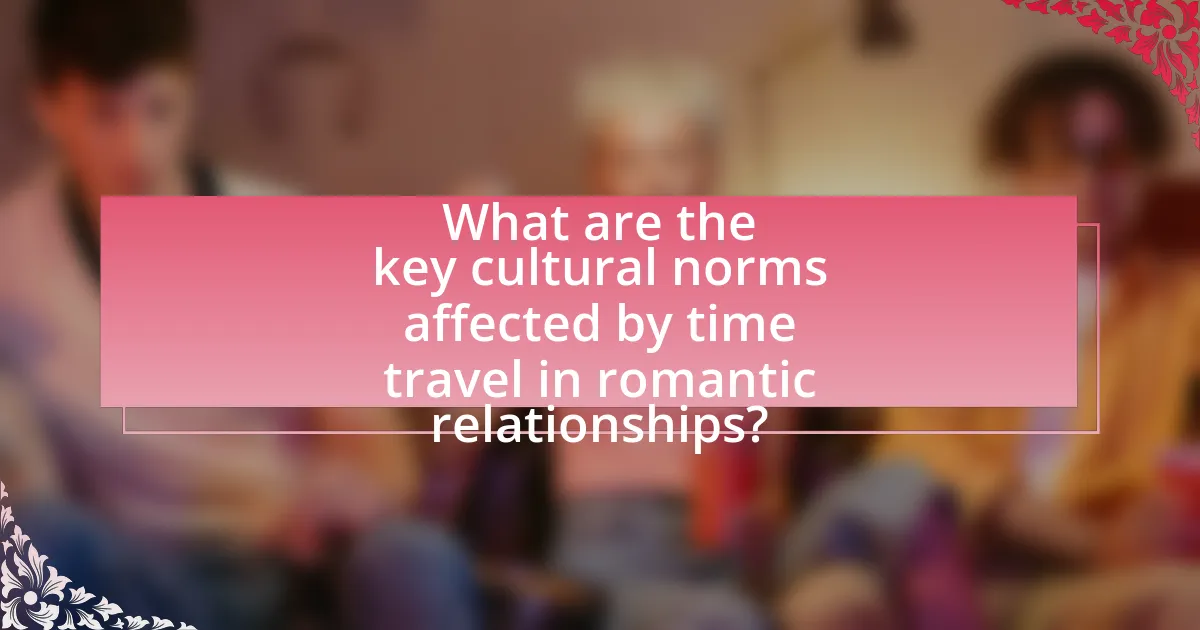
What are the key cultural norms affected by time travel in romantic relationships?
Key cultural norms affected by time travel in romantic relationships include the perception of fidelity, the concept of time as a linear progression, and the understanding of personal identity. Time travel challenges traditional views on fidelity, as individuals may form connections with past or future partners, complicating the notion of commitment. Additionally, the linearity of time is disrupted, leading to a reevaluation of how relationships evolve and the significance of shared experiences. Personal identity is also impacted, as time travelers may grapple with different versions of themselves across timelines, influencing their emotional connections and relationship dynamics. These shifts highlight the complexities introduced by time travel in romantic contexts.
How does time travel influence the concept of commitment in relationships?
Time travel can significantly alter the concept of commitment in relationships by introducing the possibility of experiencing multiple timelines and outcomes. This ability to revisit past decisions or explore future scenarios may lead individuals to question their current commitments, as they can see alternative paths and potential partners. For instance, research in speculative fiction often illustrates how characters grapple with the implications of their choices across different timelines, suggesting that awareness of alternate realities can create uncertainty and diminish the perceived value of present commitments. This dynamic can result in a more fluid understanding of relationships, where commitment becomes less about permanence and more about exploration and choice.
What role does time travel play in the perception of fidelity?
Time travel significantly alters the perception of fidelity by introducing the possibility of experiencing relationships across different timelines. This concept challenges traditional notions of loyalty and commitment, as individuals may encounter alternate versions of their partners or even themselves, leading to complex emotional dynamics. For instance, in narratives like “The Time Traveler’s Wife,” the protagonist’s ability to move through time complicates his romantic fidelity, as he interacts with his partner at various stages of her life. This illustrates how time travel can create scenarios where the boundaries of fidelity are tested, prompting individuals to reconsider their definitions of loyalty and emotional attachment.
How might time travel affect the expectations of romantic partners?
Time travel could significantly alter the expectations of romantic partners by introducing complexities related to knowledge of future events and past experiences. When partners have the ability to travel through time, they may develop unrealistic expectations based on knowledge of future relationship outcomes or past mistakes, leading to heightened pressure to meet those expectations. For instance, if one partner knows they will face a breakup in the future, they might act differently in the present, potentially creating tension or anxiety in the relationship. Additionally, the ability to revisit past moments could lead to dissatisfaction with the present, as partners may compare their current relationship to idealized versions of their past. This dynamic can create a cycle of expectation that is difficult to navigate, ultimately impacting the stability and satisfaction within romantic relationships.
What changes occur in societal views of love due to time travel?
Time travel can significantly alter societal views of love by introducing historical perspectives and future possibilities that reshape contemporary understandings. For instance, exposure to romantic ideals from different eras, such as the courtly love of the Middle Ages or the liberated relationships of the 1960s, can challenge current norms and expectations. This exposure may lead to a more inclusive view of love, embracing diverse forms such as polyamory or same-sex relationships, as seen in various time travel narratives like “Outlander” or “The Time Traveler’s Wife.” Additionally, witnessing future societal advancements in love, such as the acceptance of artificial intelligence as partners, can prompt discussions about the nature of love itself, pushing boundaries of traditional definitions. These shifts illustrate how time travel serves as a catalyst for evolving perceptions of love, encouraging societies to reconsider and redefine their romantic ideals.
How does time travel reshape the idea of soulmate connections?
Time travel reshapes the idea of soulmate connections by introducing the possibility of meeting one’s soulmate across different timelines and realities. This concept challenges the traditional notion that soulmates are destined to meet in a linear progression of time, suggesting instead that connections can transcend temporal boundaries. For instance, narratives in literature and film often depict characters who travel to the past or future, encountering their soulmates in alternate circumstances, which emphasizes the idea that love can exist beyond the constraints of time. This perspective aligns with theories in quantum physics, such as the multiverse theory, which posits that multiple timelines exist simultaneously, allowing for various potential soulmate encounters.
What impact does time travel have on the age and maturity of romantic partners?
Time travel can significantly alter the age and maturity dynamics between romantic partners. When one partner travels to a different time period, they may return with experiences and knowledge that far exceed their partner’s current understanding, creating a maturity gap. For instance, if a younger individual travels to the future and gains advanced knowledge or life experiences, their perspective on relationships may shift dramatically compared to their partner who has remained in the present. This phenomenon can lead to challenges in compatibility, as differing maturity levels can affect communication, emotional connection, and shared goals. Historical narratives in literature and film, such as “The Time Traveler’s Wife,” illustrate these complexities, showcasing how time travel can disrupt traditional age-related expectations in relationships.
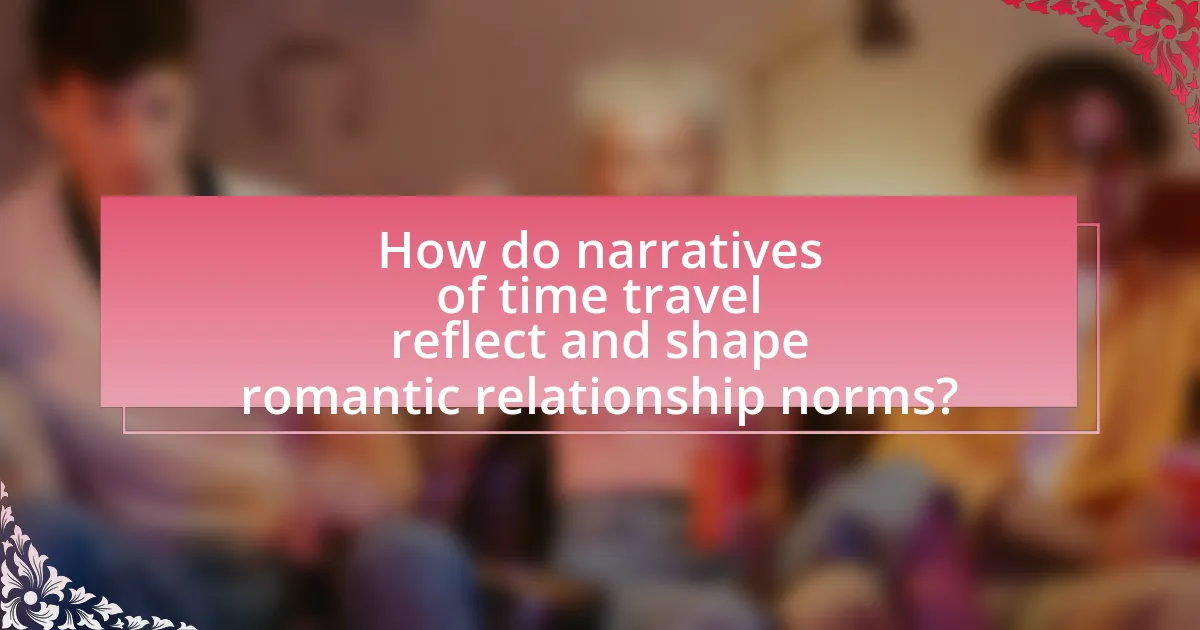
How do narratives of time travel reflect and shape romantic relationship norms?
Narratives of time travel reflect and shape romantic relationship norms by exploring themes of choice, consequence, and the fluidity of love across different temporal contexts. These narratives often depict characters who navigate complex emotional landscapes, revealing how relationships can be influenced by past decisions or future possibilities. For instance, in films like “The Time Traveler’s Wife,” the nonlinear progression of time challenges traditional notions of commitment and fidelity, suggesting that love can transcend time constraints. Additionally, time travel stories frequently highlight the importance of communication and understanding in relationships, as characters must reconcile their experiences across different timelines. This exploration of temporal dynamics ultimately reshapes societal expectations around romance, emphasizing adaptability and the significance of emotional connections over rigid norms.
What are the most influential time travel stories that explore romance?
The most influential time travel stories that explore romance include “The Time Traveler’s Wife” by Audrey Niffenegger, “Outlander” by Diana Gabaldon, and “11/22/63” by Stephen King. “The Time Traveler’s Wife” intricately weaves a love story between Henry, who involuntarily travels through time, and Clare, who experiences the consequences of his absences, highlighting the emotional toll of time on relationships. “Outlander” features Claire, a World War II nurse who time travels to 18th-century Scotland, where she falls in love with Jamie Fraser, showcasing the complexities of love across different eras. “11/22/63” follows Jake Epping, who travels back to prevent the assassination of JFK, but finds love in the past, illustrating how time travel can alter personal destinies and romantic connections. These narratives have significantly impacted cultural perceptions of love and relationships, emphasizing the challenges and depth of romantic bonds affected by time.
How do these narratives challenge or reinforce existing cultural norms?
Narratives involving time travel challenge existing cultural norms by presenting alternative realities that question traditional relationship dynamics. For instance, stories like “Outlander” depict characters who navigate different historical contexts, thereby highlighting the fluidity of love and commitment across time periods. This challenges the conventional notion of monogamy and temporal fidelity, suggesting that love can transcend societal expectations. Conversely, some narratives reinforce cultural norms by portraying time travel as a means to correct past mistakes within established relationship frameworks, as seen in films like “About Time,” where the protagonist uses time travel to enhance his romantic life while ultimately adhering to societal values of love and family. These contrasting portrayals illustrate how time travel narratives can both disrupt and uphold cultural standards in romantic relationships.
What themes emerge in time travel romances that resonate with audiences?
Time travel romances often explore themes of love transcending time, the complexity of fate versus free will, and the impact of historical context on relationships. These themes resonate with audiences as they evoke emotional connections and provoke thought about the nature of love and choice. For instance, the idea that love can endure across different eras highlights the timelessness of human emotions, while the tension between predetermined fate and personal agency invites viewers to reflect on their own life choices. Additionally, the juxtaposition of modern values against historical norms allows audiences to examine how cultural shifts influence romantic relationships, making these narratives both relatable and thought-provoking.
How can understanding these narratives inform real-world relationship dynamics?
Understanding narratives about time travel can inform real-world relationship dynamics by illustrating how cultural norms evolve and influence interpersonal connections. For instance, narratives often depict characters navigating different time periods, revealing how societal expectations shape romantic behaviors and choices. Research indicates that exposure to diverse relationship models, as seen in time travel stories, can broaden individuals’ perspectives on love and commitment, fostering adaptability in their own relationships. This adaptability is crucial, as studies show that couples who embrace changing norms tend to have healthier dynamics, as they are more open to discussing and negotiating their roles and expectations.
What practical insights can be drawn from time travel stories for modern relationships?
Time travel stories provide practical insights for modern relationships by illustrating the importance of communication and understanding in overcoming challenges. These narratives often depict characters navigating complex timelines, emphasizing that effective dialogue can resolve misunderstandings and foster deeper connections. For instance, in the film “About Time,” the protagonist learns that using time travel to fix mistakes does not substitute for genuine emotional engagement, highlighting that addressing issues directly is crucial for relationship growth. This reinforces the idea that proactive communication is essential in real-life partnerships, as it allows individuals to address conflicts and strengthen their bonds.
How can couples apply lessons from time travel narratives to enhance their relationships?
Couples can apply lessons from time travel narratives to enhance their relationships by embracing the concept of perspective-taking and understanding the impact of choices over time. Time travel stories often illustrate how decisions made in the past can affect the present and future, encouraging couples to communicate openly about their feelings and experiences. For instance, narratives like “The Time Traveler’s Wife” highlight the importance of patience and empathy, as characters navigate complex timelines and emotional challenges. This teaches couples to appreciate each other’s journeys and foster a deeper connection through shared understanding and support. By recognizing that their actions and words can have lasting effects, couples can cultivate a more thoughtful and intentional approach to their relationship, ultimately leading to greater harmony and resilience.
What are some best practices for navigating cultural norms in romantic relationships influenced by time travel?
Best practices for navigating cultural norms in romantic relationships influenced by time travel include thorough research of the historical and cultural context of the time period being visited, open communication with partners about differing cultural expectations, and adaptability to new social norms. Understanding the specific customs, values, and relationship dynamics of the era can prevent misunderstandings and foster respect. For instance, a time traveler should familiarize themselves with the gender roles and courtship practices of the past to avoid unintentional offense. Additionally, discussing these differences with a partner can help both individuals align their expectations and navigate potential conflicts. Adaptability is crucial, as norms may vary significantly across time periods, requiring flexibility in behavior and attitudes to maintain a harmonious relationship.
